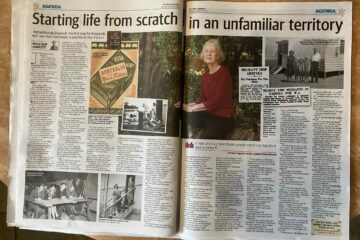In this 2012 paper published in the AEMI Journal, Dr. Nonja Peters examines the migration experiences of approximately 160,000 Dutch individuals who relocated to Australia following World War II. The study delves into how various factors—local, national, and global influences, as well as social, cultural, and economic policies in both the Netherlands and Australia—shaped the migrants’ expectations and how these expectations aligned with the realities they encountered upon arrival.
Key Themes and Findings:
- Government Policies and Promises: The Australian government’s post-war immigration policies aimed to attract European migrants to bolster the workforce and population. Promotional materials often painted Australia as a land of opportunity, leading many Dutch migrants to expect a prosperous and welcoming environment.
- Cultural and Social Challenges: Upon arrival, many Dutch migrants faced significant cultural and social barriers. The assimilation policies of the time often disregarded the preservation of migrants’ cultural identities, leading to feelings of isolation and cultural loss.
- Economic Realities: While some migrants found employment opportunities, others struggled with job insecurity and underemployment, which contrasted sharply with the expectations set before migration.
- Community and Identity Formation: Despite challenges, Dutch migrants formed tight-knit communities, establishing social clubs, churches, and schools to maintain their cultural heritage and support one another.
- Long-term Impact: The paper highlights the resilience of Dutch migrants and their contributions to Australian society, while also critiquing the lack of support structures that could have eased their integration and preserved their cultural identities.
Overall, Dr. Peters’ research underscores the complexities of migration experiences and the discrepancies between migrants’ expectations and the realities they faced in post-war Australia.
You can download the pdf from here.
Biography of Dr. Nonja Peters
Early Life and Migration:
Dr. Nonja Yvonne Huberta Maria Peters was born on February 27, 1944, in Tilburg, Netherlands, during the final years of World War II. Her early life was marked by the hardships of war, including her parents’ forced labor under the Nazi regime. In 1949, seeking a better life, her family emigrated to Australia, settling first in Subiaco, Western Australia, before moving to rural towns like Toodyay and Northam. These early experiences as a migrant child deeply influenced her future academic and professional pursuits.
Education and Academic Career:
Despite leaving school at 15 to support her family, Dr. Peters pursued further education later in life. She earned her Ph.D. in anthropology from the University of Western Australia in 2000, focusing on immigrant entrepreneurship among Dutch, Greek, Italian, and Vietnamese communities in Western Australia. Her academic work is characterized by a multidisciplinary approach, combining anthropology, history, and social research to explore themes of migration, identity, and cultural preservation.
Professional Contributions:
- Academic Roles: Dr. Peters has held various academic positions, including roles at Curtin University and Edith Cowan University, where she has contributed to research on migration, ethnicity, and citizenship.
- Museum Curation: She has curated numerous exhibitions that document and celebrate the experiences of migrants in Australia, such as “A New Australia: Postwar Migration to Western Australia” and “A Sense of Place: Postwar Migration to Northam.”
- Publications: Dr. Peters is the author of several influential works, including:
- Milk and Honey – But No Gold: Postwar Migration to Western Australia 1945–1964
- The Dutch Down Under: 1606–2006
- From Tyranny to Freedom: Dutch Children from the Netherlands East Indies to Fairbridge Farm School 1945–1946
- Depok – De droom van Cornelis Chastelein
- Advocacy and Community Engagement: Beyond academia, Dr. Peters has been actively involved in community organizations, such as co-founding the Dutch Australian Community Services (DACS) and serving on various advisory committees related to migration and cultural heritage.
Recognition:
In 2022, Dr. Peters was inducted into the Western Australian Women’s Hall of Fame, acknowledging her significant contributions to the understanding and preservation of migrant histories in Australia.
Dr. Nonja Peters’ work provides invaluable insights into the migrant experience in Australia, highlighting the challenges and triumphs of those who sought a new life in a foreign land. Her dedication to documenting and preserving these stories ensures that the complexities of migration are acknowledged and remembered.


